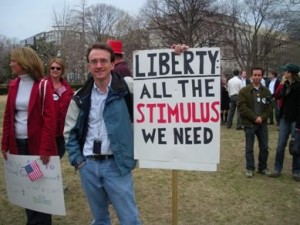 These thoughts on the upcoming election really stuck in my mind, so I thought I’d share them. They’re from Michael Tomasky, American editor-at-large for The Guardian. The complete article, “The Elections: How Bad for Democrats?,” is available online from The New York Review. (emphasis added)
These thoughts on the upcoming election really stuck in my mind, so I thought I’d share them. They’re from Michael Tomasky, American editor-at-large for The Guardian. The complete article, “The Elections: How Bad for Democrats?,” is available online from The New York Review. (emphasis added)
In American politics, Republicans routinely speak in broad themes and tend to blur the details, while Democrats typically ignore broad themes and focus on details. Republicans, for example, speak constantly of “liberty” and “freedom” and couch practically all their initiatives—tax cuts, deregulation, and so forth—within these large categories. Democrats, on the other hand, talk more about specific programs and policies and steer clear of big themes. There is a reason for this: Republican themes, like “liberty,” are popular, while Republican policies often are not; and Democratic themes (“community,” “compassion,” “justice”) are less popular, while many specific Democratic programs—Social Security, Medicare, even (in many polls) putting a price on carbon emissions—have majority support. This is why, when all else fails, Democrats try to scare people about the threat to Social Security if the GOP takes over, as indeed they are doing right now.
What Democrats have typically not done well since Reagan’s time is connect their policies to their larger beliefs. In fact they have usually tried to hide those beliefs, or change the conversation when the subject arose. The result has been that for many years Republicans have been able to present their philosophy as somehow truly “American,” while attacking the Democratic belief system as contrary to American values. “Putting us on the road to European-style socialism,” for example, is a rhetorical line of attack that long predates Obama’s ascendance—it was employed against the Clintons’ health care plan as well. …
[W]e have a new faction, the well-financed Tea Party movement that has been able to arrogate to itself practically every symbol of Americanism and to paint the President, his ideas and policies, and his supporters as not merely un-American but actively anti-American. In a Newsweek poll released in late August, nearly a third of Americans actually agreed that it was “definitely” or “probably” true that Obama “sympathizes with the goals of Islamic fundamentalists who want to impose Islamic law around the world.”
In the face of all this, it seems not to have occurred to a single prominent Democrat, from Obama on down, to say something like: We love our country every bit as much as they do, and we believe patriotism means expanding access to health care, protecting the environment, and imposing effective new rules on Wall Street. Democrats have thus crippled themselves by adapting comparatively limited ideas of legitimate political action, and by ceding to Republicans the strong claim of love of one’s country.
Related posts:
Understanding the Tea Party
Can one communicate in a world of truthiness?
How socialist is the US?
Resources:
Image source: Michelle Malkin
Michael Tomasky, The Elections: How Bad for Democrats?, The New York Review of Books, October 28, 2010


I don’t belong to any organized political party. I’m a Democrat. Will Rogers
Tomasky pretty much sums up the problem with today’s Democrats. The issue/s he does not touch on but is/are also important to me are Constitutional rights to privacy and habeas corpus. In 2006 I officially changed my registration to Independent because of this.
More Will Rogers: “I don’t make jokes. I just watch the government and report the facts.”
And this one’s for you: “An onion can make people cry, but there has never been a vegetable invented to make them laugh.”